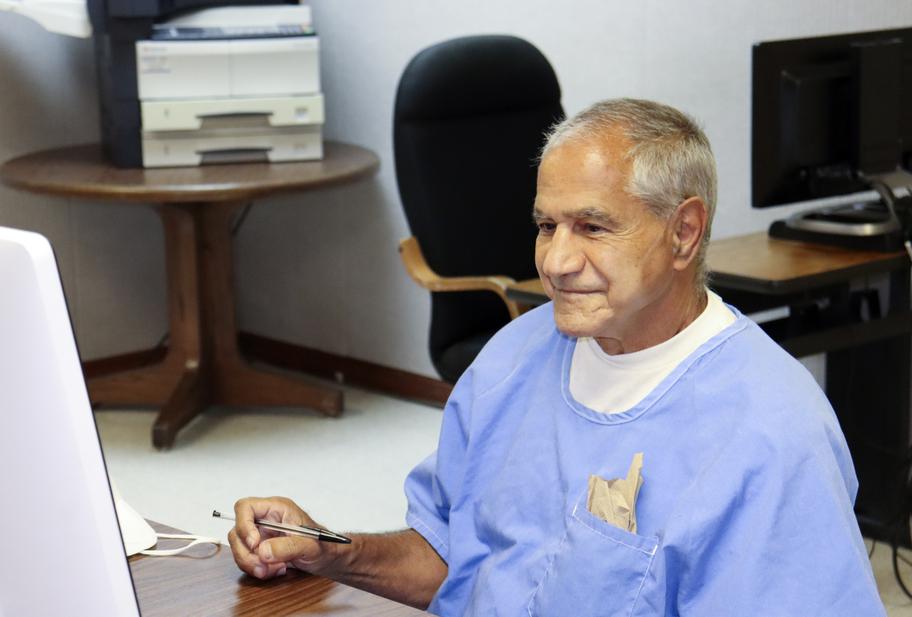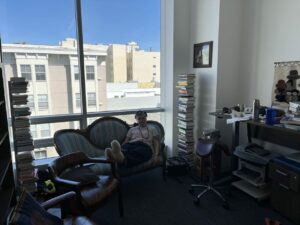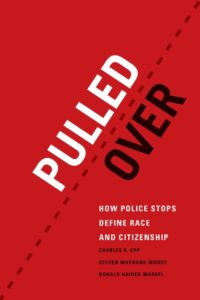
Tomorrow, the Californians who have not yet voted by mail will participate in yet another recall election. I’ve already spilled enough pixels explaining why I voted no, and why you should do the same. But I do want to say something about the deep ambivalence that prison activists and advocates probably feel around this election. People can and should contain multitudes of contradictions and complicated opinions.
Over the weekend, Bob Egelko of the Chronicle wrote this interesting and insighftul piece about Sirhan Sirhan, now 77 years old after five decades in prison for the murder of Robert Kennedy. Sirhan was recommended for parole by the board,, which means that his case is now on Newsom’s desk. And as Egelko explains (with a little assist from Stanford’s Bob Weisberg and from yours truly), the political calculus is heavily rigged against Sirhan:
“Anybody that has ever walked into my office, you have to walk by photographs of Bobby Kennedy’s funeral procession, those famous train photos,” the governor said, according to a transcript provided by his office. “The first photograph, the only photograph you will see in my office is a photo of my father and Bobby Kennedy just days before Bobby Kennedy was murdered.”
Newsom’s leading opponents in the recall are well to his right politically and would seem equally unlikely to approve Sirhan’s parole. And any decision to release Kennedy’s murderer would surely become a flash point in the 2022 governor’s election.
“I’d be shocked if Newsom didn’t reverse” the parole board’s decision, said Robert Weisberg, a Stanford criminal law professor. Although the governor would have to explain why he believed Sirhan still posed a threat of violence, Weisberg said, he would most likely be “responding to a public view that this guy’s crime was so heinous that he shouldn’t be paroled.”
Egelko is right on the money, as was Jonathan Simon in Governing Through Crime: it is an asset to left-wing politicians to position themselves as tough-on-crime where their supporters have no leverage. This is especially true in California which, as Vanessa Barker explains, is a populist, polarized state. The only two discounts on that front have been recession-era fiscal concerns and riding a popular racial justice wave in progressive cities. And keep in mind that Sirhan is not alone: the entire “Class of ’72′”–the folks whose sentences were commuted after People v. Anderson, including the Manson family members–has been reviled for decades. After the return of the death penalty, the weakening of the parole system, and the politicization of the whole process, the prospects of release for anyone who could peel centrists off the left base became dim. Egelko explains why:
The law allowing the governor to veto parole decisions was passed after courts rejected Gov. George Deukmejian’s attempt in 1983 to block the parole of William Archie Fain, who had served 16 years in prison for murder and rape in Stanislaus County. The Legislature put Proposition 89, a state constitutional amendment, on the ballot in 1988 and it was approved by 55% of the voters.
Even before the ballot measure, convicted murderers were seldom paroled, even after decades in prison. The board has historically approved their release in less than 10% of the cases, and in some years less than 5%, leaving the others to continue serving life sentences.
Gov. Pete Wilson overruled the board about 30% of the time. His successor, Gov. Gray Davis — who declared, soon after his election, that “if you take someone else’s life, forget it” — vetoed all but six grants of parole, just above 1% of the total approved by the board. Gov. Arnold Schwarzenegger rejected about 70% of the board’s parole decisions.
The trends shifted under Gov. Jerry Brown, who overturned the board only about 20% of the time, and so far under Newsom as well.
And warnings of the dangers of paroling convicted murderers do not appear to be supported by the evidence: Between 1995 and 2010, 48.7% of all former prisoners in California went on to commit new crimes after their release, but among the 860 prisoners convicted of murder who were paroled, only five — 0.58% — had been jailed or imprisoned again, according to a report by the Stanford Criminal Justice Center.
“You age out of violent crime,” said Hadar Aviram, a law professor at UC Hastings in San Francisco.
But while Newsom has overseen the court-ordered reduction of the prison population, now at lowest its level since 2006, and has proposed closing two state prisons by 2023, Aviram — author of the recent book “Yesterday’s Monsters: The Manson Family Cases and the Illusion of Parole” — said Newsom’s response to the proposed parole of a Charles Manson follower was a likely indicator of his future decision on Sirhan.
The parole board has repeatedly recommended release of Leslie Van Houten, who was convicted of taking part in two of the Manson family’s Los Angeles-area murders in 1969, when she was 19. While Van Houten has a clean prison record and has earned college degrees behind bars, Newsom said in November that her “explanation of what allowed her to be vulnerable to Mr. Manson’s influence remains unsatisfying” — his second veto of her parole, after two similar decisions by Brown.
“The gubernatorial veto was introduced in 1988 anticipating precisely this scenario,” Aviram said. It was a “power shift,” she said, from “professionals,” such as psychologists and prison counselors who advise the parole board, “toward the limelight of sensationalized, politicized coverage” and changed outcomes.
The upshot of all this: I feel quite bitter. In the last few weeks I’ve seen the people who have ample cause for resenting Newsom–the people whose family and friends are behind bars, facing risk of illness and death because this administration wallowed and waffled on releases while at the same time vigorously defending medical atrocities, indifference and ineptitude in court–unequivocably and firmly doing the right thing, voting “no” on the recall and encouraging everyone they know to do the same. I resent that they are being put in this position. I resent that we are all being put in this position. I resent that a politician whom I deeply admire for what he has done for same-sex marriage and death penalty abolition takes the easy and expedient way–again and again!–whenever someone behind bars is concerned. I resent that incarcerated people and their families are always the sacrificial lambs in these left-versus-right California tumbles, because the right-wing candidates are perceived as much worse. I resent that the incentive structure is always stacked against releasing old and sick people from prison–even though there is compassion and redemption to be gained and nothing to be lost from a public safety perspective. I resent that the people doing the hardest activist work stand to gain absolutely nothing–no sympathy, no consideration, no concessions, no compassion, no fairness–from doing the right thing for everyone else.
In sum, if you feel resolute and at the same time awkward about your “no” vote, you’re not alone. You’re part of a captive support contingent for blue politicians in California–some members of which are literally captive. It is possible to accept that anyone on the replacement list–particularly Larry Elder–would be disastrous as governor, and to respect and admire Newsom as a capable and experienced politician, while at the same time deeply resent the fact that, once again, urgent human rights issues–true life-and-death matters–have been swept under the rug.
How to fix this? Abolish the gubernatorial veto. Diversify parole boards. Change parole from a wacky card game with no rules, which the house always wins, to an instrument of true hope and transformation. But none of this will happen before tomorrow. So, we will dutifully vote “no”, because we are not single-issue dolts, and continue to await the change that never comes.




No comment yet, add your voice below!